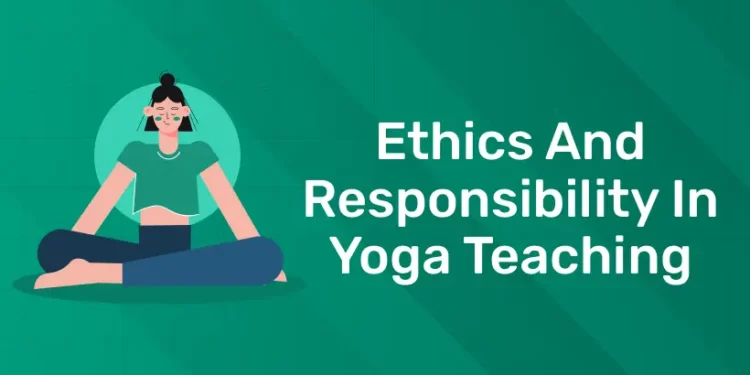Table of Contents
Despite the field we work in, ethics is really important in the field in which we are working. This will prove the professionalism. Yoga teaching also includes the ethics and responsibilities that are essential for the flourishing of the fitness sector. Ethics is the most significant aspect of Yoga. Yoga revolves around the responsibility towards oneself along with the ethics towards your passionate profession.
Ethics and Yoga Teaching
It is instructed for yoga educators to adopt explicit lifestyle options and maintain a virtuous principle while teaching yoga to the students. As yoga teachers, your manners, moves and phrases are regularly monitored, evaluated and assessed. Even if it is less noticeable, it is highly important.
As yoga teachers, you have to hold on to integrity and credibility. Fulfilling the anticipations of your pupils confirms belief, translucency and solace among learners. Leading an authentic life is the most inevitable criterion for a yoga trainer.
Yogic dogma also endorses instructors to facilitate a harmonious vigour, enabling them to incorporate regulations. They are advised to stick to Niyamas (self-discipline rules) and Yamas (social norms) to change the direction of their lifestyle.
The Yoga teachers represent Yoga itself, so it is mandatory to stick to the duties, ethics and responsibilities which will be a model for your students. It is the responsibility of a yoga teacher to be legitimate, trustworthy, and compliant in instructing students.
Be a Certified Trainer! Join Our Yoga Teacher Training Course!
Yoga teachers should refine themselves and be pious while communicating with their pupils, colleagues, and peers. They have to be professional enough while dwelling in fruitful communication with the public as they describe yoga.
Nonetheless of the clan, type, course of education, or membership level, a trainer should disseminate the perspectives and standards of yoga to the pupil. Upholding the public image of yoga plays an essential role. The yoga teachers have a responsibility towards the public as they are the light bearers who hold a better mirror to the changing lifestyle of the people in the society.
Basic Ethics in Yoga Teaching
1: Which of these is the primary goal of yoga practice?
Ethics and Responsibility while teaching yoga include:
Ethics is the key to the professionalism of an individual. This is even more important when we consider the fitness and healthiness field. In yoga pedagogy, ethics is of the greatest importance. Here are the basic principles of ethics for Yoga instructors who wish to flourish in their careers as masters of yoga.
As yoga teachers, it is critical to maintain the sense that you are directing your students towards relinking their material, cognitive, and celestial being. Teaching with aptness and clarity is of utmost importance. A yoga instructor can be a crucial component in guiding a pupil towards the cognitive and physical well-being of the students.
Be a Certified Trainer! Join Our Yoga Teacher Training Course!
Make sure that you are creating a comfortable space for the students. They have to practice the yoga postures with ease. A clean and comfortable space can help them to relax. Treat your students equally, irrespective of their orientation, generation, body type, sex, age, caste, religion or race.
Each student requires equivalent awareness and consideration. You have to understand the needs of your students without criticizing them. Keep a secure passionate and bodily space from your pupils as any extension will only bring in the course of fulfilling your commitment as a yoga teacher. Be clear, calm and composed while approaching the students. Avoid reckoning others and formulate self-awareness.
- Maintain the virtue of the profession by coaching experienced professional exchanges.
- Respecting pupils, professors, coequals, and colleagues in the realm of yoga.
- Deliver secure and practical education and uncluttered, cozy and unrestricted conditions for all instructors.
- Furnish similar and equitable therapy and treatment to all pupil
- Complete exercise and instruction as a prerogative task
- Stick to the laws and adhere to the rules
- Speak politely to everyone as you uphold the torch to a shifting paradigm
- Preserve the confidentiality of the details related to the students under your supervision
- Appreciate the fairness, pride and privacy of your pupils.
- Maintain professionalism throughout your career
- Be the epitome of yoga by practicing wellness and calmness
- Recognize the boundaries of mastery and dimensions of technique, and guide pupils to better-skilled medical, fitness, or restoration experts
- Recognize and accept the traditions that proclaim approach, method and the ground where you practice on
Be a Certified Trainer! Join Our Yoga Teacher Training Course!
Teach your students with compassion and consideration by stressing justice, empathy, and directness in education constitutes the foundation stone of yoga teacher standards.
A yoga teacher strives to infuse in their pupils the principled and honest regulations that construct the footing of a yoga routine. You have to guide your students to equip themselves in the mental, emotional, spiritual and physical realms.
An accurate and real yoga instructor strives to tutor learners towards appropriate strategies for exemplary development. In the procedure of stances, this recommendation repeatedly applies differing phases of bodily communication. Seeking consent while instructing students should consider the student’s comfort level with touch. You have to understand the student’s emotional level to be more precise while teaching Yoga.
Be a Certified Trainer! Join Our Yoga Teacher Training Course!
Become a Certified Yoga Instructor
Yoga Teacher Training Course by Entri App: Master authentic yoga techniques, earn certification, and build a successful career as a professional yoga instructor.
Join Now!Responsibilities of a Yoga Teacher
The major responsibilities while being a yoga teacher are to guide and instruct the yoga. The yoga teacher should stick to the ethics and principles of yoga. The philosophy of adhering to yoga includes imparting knowledge and wisdom to the pupil in a professional way. The yoga trainers will be given training on how to carry out the duties and responsibilities without disturbing the natural flow of things.
Restrain yourself from making errors or improper giving away of knowledge while teaching. Another important forte is to complete a secure and relaxing learning environment for the students to extend up to you while preserving an intact student-teacher connection.
The teaching-learning method should be an innovative one and it should connect a learner to the wisdom of yoga. Introducing how to rehearse secure and proper procedures is another essential precedence of instructing yoga. Providing frank feedback to the students is a must.
Be a Certified Trainer! Join Our Yoga Teacher Training Course!
The motivating characteristic that should be part of the yoga teacher’s life is that the student should be able to connect with the teacher. The student’s habits should be shaped and the teacher should act as another guide that a yoga instructor should be more focused on. A yoga teacher needs to be able to involve the philosophic elements of yoga in everyday life.
The teacher should be in a position to apply the yoga philosophy especially the base of Yamas and Niyamas while passing on the wisdom of yoga. A yoga teacher teaching a 200-hour Yoga TTC will be accomplished.
Responsibilities to be fulfilled while following the passion as a Yoga TTC
- As the students enter for the session, welcome and greet the pupils with a smile
- Understand the students on a personal level
- Keep a personal track of the pain and injuries of each student
- Communicate with students individually and try to understand their situations
- Ascertain the status of each pupil and direct them accordingly.
- Enable the students to acclimate to the postures with comfort through mutations and interpretations.
- Schedule and master the higher levels of the philosophy of yoga
- Treat students equally
- Hold etiquette while considering teaching yoga
How is Yoga Teaching Linked to Ethics?
The behavior of a yoga teacher talks a lot about character and qualities. A proficient connection between yoga teachers and students should be harbored. The intentions should be pure and innocent. Teaching yoga is an honorable vocation. You need to spend time and effort finding the best ways to approach it with passion.
Ethical directions instruct teachers to understand and approach students with the highest admiration and develop an inclusive teaching-learning space in class. Yoga teachers should respect each other. Integrity and openness must pervade the efforts of yoga educators. The yoga teachers should maintain decorum while indulging themselves in training.
Be a Certified Trainer! Join Our Yoga Teacher Training Course!
You have to understand how to create volitional conclusions in different phases of life. As mindfulness enhances, you will be in a position to master the art of purposeful residence. The tendency to understand the importance of yoga enables you to adjust and apply honorable behavior as a coach.
Introducing yoga stretches above employment. As a yoga teacher, you will holistically approach life by instructing students to embrace yoga’s principles invariably. Thoroughly understand the philosophies of yoga.
Educators must attach to a cluster of honest and righteous regulations sought to direct their yoga education with righteousness, compassion, and decency. This retains significance such as empathy, charity, humanitarianism, purity, tolerance, patience, helpfulness and forgiveness.
Entri’s Yoga Teachers Training Course is the best platform for you to learn the nuances of yoga instructions from experts. The comprehensive and systematic teaching-learning methodologies can enlighten the aspirants. The study plans and the daily practice sessions will aid you in qualifying as a yoga instructor with experience and qualifications. Entries yoga teacher’s training will allow you to expand your learning horizon with a personalized and flexible learning space.
Become a Certified Yoga Instructor
Yoga Teacher Training Course by Entri App: Master authentic yoga techniques, earn certification, and build a successful career as a professional yoga instructor.
Join Now!Frequently Asked Questions
What are the principles of a yoga teacher?
The major principles include Teaching with aptness and clarity, creating a safe and comfortable space and sticking on to the principles and philosophies of yoga.
What is the role of the teacher while instructing yoga?
The yoga teacher should act as a facilitator, motivator, friend, philosopher and guide who adheres to the philosophies of yoga.
What is more important in the life of a yoga teacher?
You have to stick to the basic life-changing aspects of yoga by leading an authentic life is the most inevitable criterion for a yoga trainer. Yogic dogma also endorses instructors to facilitate a harmonious vigor, enabling them to incorporate regulations
What are the two key rules to be strictly followed by the yoga instructors?
The yoga instructors should stick on to the Niyamas (self-discipline rules) and Yamas (social norms) to change the direction of their lifestyle. The Yoga teachers represent Yoga itself, so it is mandatory to stick to the duties, ethics and responsibilities which will be a model for your students.
What are the 7 yoga principles?
The 7 yoga principles are as follows:
- Law of Pure Potentiality
- Law of Giving and Receiving
- Law of Karma
- Law of Least Effort
- Law of Intention and Desire
- Law of Detachment
- Law of Dharma.























